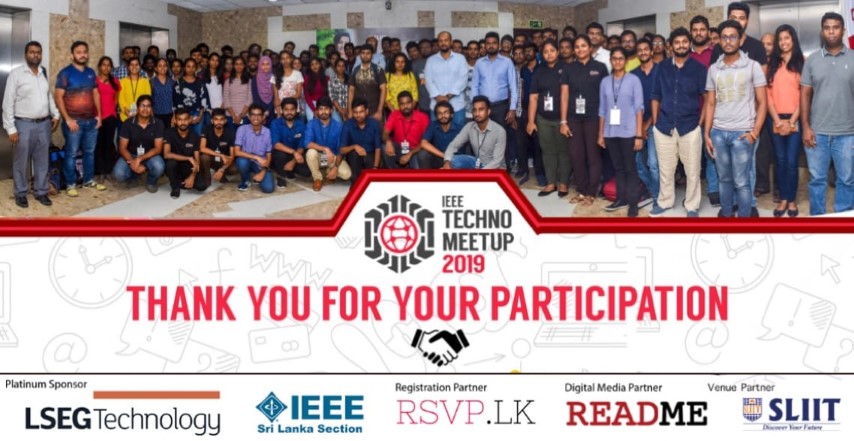IEEE Techno Meetup - Quantum Computing
IEEE Techno Meetup 2019 – Meetup 03, Quantum Computing

Following the success of the first two meetups of the IEEE Techno Meetup, a technology-based meetup organized by the IEEE Sri Lanka Section, the third meetup of the series was organized under the topic “Quantum Computing”, which deals with the future of computer sciences. It was organized with the objective of giving an overview of its theoretical approach, usage in industry and the potential use cases in the future.
The 3rd meetup of the series of meetups for the year 2019/20 organized by the IEEE Sri Lanka section was held on the 3rd of October 2019, having SLIIT Metropolitan Campus as the venue partner for the meetup.
README joined hands with the IEEE Techno Meetup Organizing Committee for the year 2019/20 as the digital media partner while RSVP.LK was the event management partner. LSEG Technology is on board with the organizers as the Platinum Partner of the IEEE Techno Meetup 2019/20 meetup series.
Altogether 80 participants were present at SLIIT Metropolitan Campus, making it a full house on the 16th floor of BOC Merchant Tower overlooking the busy streets of Colombo.
There were two guest speakers in the meetup; one speaker from academia and the other speaker from the industry, focusing on the above-mentioned aspects respectively. Dr. Anuradha Mahasinghe, Senior Lecturer from the Department of Mathematics of the University of Colombo, represented academia and Mr. Daham Positha Pathiraja, Associate Technical Lead at Sysco Labs was the speaker from the industry.
Mr. Daham Pathiraja is an Associate Technical Lead at Sysco LABS and leads the Ops Engineering Team for CAKE Core at Sysco LABS as an Engineering Lead. He has over 4 years of experience engineering highly scalable client-server and consumer applications, and proactive monitoring systems. He conducted his session on the topic, Quantum computing in simple terms.
At first, he focused mainly on the basic concepts of quantum computing and quantum computing model. Then he explained the Qubit which is the fundamental unit of quantum information. In there he talked about single qubit and multiple Qubit and how they work.
Then he focused on Qubit gates like NOT, Hadmard and Phase shift. He pointed out that quantum instruction is a measure and explained it further with the CNOT gate. Then he described a simple quantum computing program for creating a bell pair. He especially talked about the application of bell pair, quantum teleportation. Further, he explained about RSA cryptography which is a more complex problem in quantum computing.
Finally, he pointed out the world’s focus on quantum computing. In there he talked in detail the famous quantum computer manufacturer, the D-Wave Company and some other companies like Intel, IBM, Microsoft, and Google. So, at present quantum emerged technologies have begun to emerge in various areas of science and engineering and quantum computers can use certain phenomena from quantum mechanics, such as superposition and entanglement, to perform operations on data.
Dr. Anuradha Mahasinghe has nine years’ research experience in quantum computing. He was attached to the quantum dynamics and computing research group at the University of Western Australia and the quantum computing group at the University of Auckland. He has published several papers on quantum computing in prestigious journals for which he won national awards. Further, he has developed quantum algorithms that have been run successfully on the world's first commercially available quantum computer. He is currently teaching at the Department of Mathematics, University of Colombo, where he is the Deputy Director of the Centre for Mathematical Modelling.
In his session, he mainly focused on the theoretical models of quantum computing starting from explaining the challenges faced in computing. He took three example problems into consideration, which are linear systems, qubo and graph isomorphism. There he specifically mentioned the complexity of these problems which are polynomial, np-complete and np intermediate respectively and mentioned that there is not a polynomial-time solution for any of the no-complete problems which would ultimately solve all the existing problems.
He further elaborated on the prevailing quantum algorithms like Shor’s factorizing algorithm, Grover’s algorithm, and HHL algorithm. There he pointed out that the reason for the criticism towards quantum computing is due to lack of the progressiveness of new algorithmic approaches in the field. Then he focused on the frameworks of computing which are quantum circuit model, quantum walk model, and adiabatic model. He concluded his session by emphasizing on the fact that the complexity of quantum annealing is still ambiguous and going through the challenges faced in the field.
Date and Time
Location
Hosts
Registration
- Date: 03 Oct 2019
- Time: 12:00 PM UTC to 02:00 PM UTC
-
 Add Event to Calendar
Add Event to Calendar
- Contact Event Host
-
Chamika Sudusinghe
Secretary
IEEE Techno Meetup 2019
- Co-sponsored by LSEG
Speakers
Mr. Daham Pathiraja of Sysco Labs
Dr. Anuradha Mahasinghe of University of Colombo
